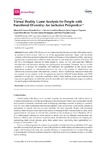Virtual Reality Game Analysis for People with Functional Diversity: An Inclusive Perspective

Use este enlace para citar
http://hdl.handle.net/2183/26460
A non ser que se indique outra cousa, a licenza do ítem descríbese como Atribución 4.0 Internacional
Coleccións
- Investigación (FCS) [1293]
Metadatos
Mostrar o rexistro completo do ítemTítulo
Virtual Reality Game Analysis for People with Functional Diversity: An Inclusive PerspectiveAutor(es)
Data
2020-08-20Cita bibliográfica
Miranda-Duro, M.d.C.; Concheiro-Moscoso, P.; Viqueira, J.L.; Nieto-Riveiro, L.; Domínguez, N.C.; García, T.P. Virtual Reality Game Analysis for People with Functional Diversity: An Inclusive Perspective. Proceedings 2020, 54, 20. https://doi.org/10.3390/proceedings2020054020
Resumo
[Abstract]
Virtual reality (VR) allows us to simulate everyday life environments with realism and in an immersive environment, with the use of the appropriate hardware. People with functional diversity, either because of environmental barriers or because of their reduced mobility, have fewer opportunities to participate in different daily activities or risk situations outdoors. Therefore, VR can be a technological resource for these people to access, try out, and experience different environments and scenarios, offering new participation experiences. Therefore, the aim of this proposal is to analyze the properties and determine the possibilities of the virtual reality applications available on commercial platforms for use in the practice of rehabilitation and intervention aimed at people with functional diversity. This is a transversal, descriptive study that has focused on the analysis of the 40 applications from the STEAM Virtual Reality and VIVE platforms for High Tech Computer Corporation (HTC). After analysis, it has been observed that there are no applications available that are fully accessible and with a minimum degree of usability for use by people with functional diversity.
Palabras chave
Virtual reality
Functional diversity
Accessibility
Functional diversity
Accessibility
Versión do editor
Dereitos
Atribución 4.0 Internacional
ISSN
2504-3900






